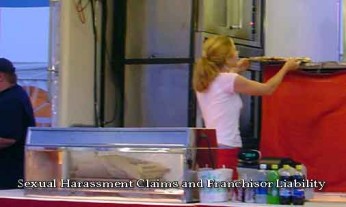Sexual harassment claims and franchisor liability. If you are a franchisor and you have franchises in the state of California, you should be aware that you may be found liable if a sexual harassment claim is filed against you based on the conduct of one of your franchisees.
 The Supreme Court of California’s decision in the case of Patterson v. Domino’s Pizza, LLC has shed some light on the circumstances in which a franchisor can be held liable. The ruling states that a franchisor will be liable for sexual harassment if “it has retained or assumed the right of general control over the relevant day-to-day operations at its franchised locations.”
The Supreme Court of California’s decision in the case of Patterson v. Domino’s Pizza, LLC has shed some light on the circumstances in which a franchisor can be held liable. The ruling states that a franchisor will be liable for sexual harassment if “it has retained or assumed the right of general control over the relevant day-to-day operations at its franchised locations.”
The Sexual Harassment Case
The harassment claim was filed by an employee named Taylor Patterson who worked at a Domino’s Pizza franchise owned by a company named Sui Juris. Patterson filed a sexual harassment complaint under California’s Fair Employment and Housing Act (FEHA) against Sui Juris, her supervisor, and Domino’s Pizza itself. Her complaint alleged that the supervisor groped her and made lewd comments and gestures. The complaint also alleged that she faced retaliation after her father reported the supervisor’s behavior to Domino’s human resources department and to the police.
Patterson argued that Domino’s Pizza was vicariously liable for her harassment because her supervisor was Domino’s “agent, employee, servant and joint venturer.” Her complaint also stated that her supervisor acted “within the course, scope, and authority of such agency, employment and joint venture, and within the consent and permission of” Domino’s Pizza.
At trial, Domino’s Pizza argued that it was not vicariously liable for the supervisor’s behavior because the Sui Juris franchise was a separate business, and thus Domino’s was not the supervisor’s employer. The trial court agreed and dismissed the action against Domino’s. An appeals court overturned the summary judgment, but the California Supreme Court ultimately agreed with the trial court’s original ruling.
What the Ruling Means For Future Franchisor Sexual Harassment Cases
In the opinion, the California Supreme Court held that Domino’s Pizza could not be held responsible for sexual harassment by a franchisee because Domino’s never assumed “the traditional right of general control” that an employer would typically have over its employees. The court emphasized that Sui Juris, rather than Domino’s, provided the employees with sexual harassment training, and that Domino’s was not involved in Sui Juris’s hiring process.
While the court dismissed the action against Domino’s, it also affirmed that there are circumstances in which a franchisor will be liable for the conduct of franchisees. The ruling establishes that a franchisor can be liable for such conduct if “it has retained or assumed the general right of control over factors such as hiring, direction, supervision, discipline, discharge, and relevant day-to-day aspects of the workplace behavior of the franchisee’s employees.”
If you own a franchise, it may be well worth your time and money to ensure that your policies do not leave you open to lawsuits based on the employment practices of your franchisees. If you have a franchise or work in Sonoma County, Mendocino County or Lake County California, the employment and labor law attorneys at Beck Law P.C. in Santa Rosa can advise you on your wisest course of action.
